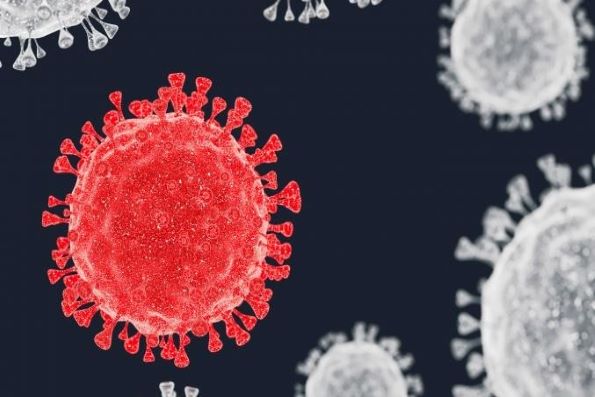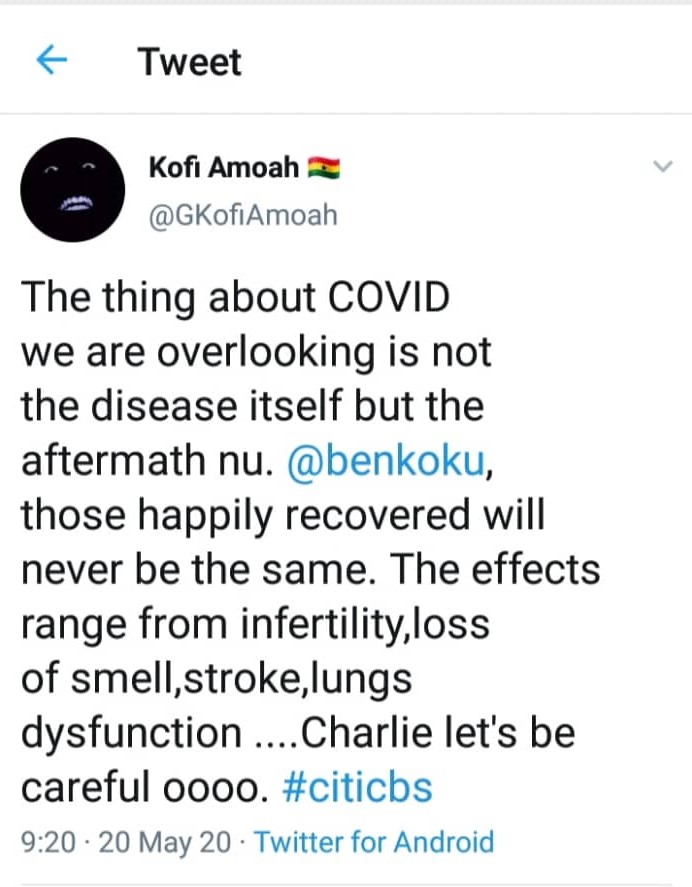Claim: COVID-19 victims suffer infertility, loss of smell, stroke and lungs dysfunction after treatment
Source: Twitter user
Verdict: Unproven
Researched by Rabiu Alhassan
Ghana has seen a sharp increase in the number of coronavirus recovery cases, with total recovered patients now 1,951, more than 30% of the country’s total confirmed coronavirus cases as of May 22.
But there are concerns that stigmatization of recovered victims will defeat attempts to reintegrate them back into society.
SAY NO TO STIGMA!!!
Stigma can undermine social cohesion and cause possible social isolation . #COVID19 #Stopstigma #ZeroStigma pic.twitter.com/IE2YW7XgZN
— UNDP Ghana (@UNDPGhana) May 21, 2020
From being shunned by neighbours, some recovered victims are having to deal with not being able to even buy basic foodstuff in their local markets, all due to misinformers stoking fear about the virus or circulating unproven information.
Victims will never be the same
So, is it true that those happily recovered coronavirus victims will never be the same because they will still have to deal with infertility, loss of smell, stroke and lungs dysfunction after treatment?
That is the claim made by a Twitter user on May 20.
Symptoms of COVID-19
“The most common symptoms of COVID-19 are fever, dry cough, and tiredness. Other symptoms that are less common and may affect some patients include aches and pains, nasal congestion, headache, conjunctivitis, sore throat, diarrhoea, loss of taste or smell or a rash on skin or discolouration of fingers or toes,” World Health Organization(WHO) has stated.
Fact-check
“Those things [ the claims on twitter] have not been really documented. If you recover from the virus, the signs and symptoms improve first even before the virus gets to zero…Most of these [signs and symptoms] are transient.” The Director of Public Health at the Ghana Health Service (GHS), Dr Badu Sarkodie said in an interview with GhanaFact.
According to the public health specialist, there are infected coronavirus patients categorized as asymptomatic who do not show symptoms and are already “living their normal lives.”
The Vice President of the Ghana Medical Association (GMA), Dr Frank Serebour said the claims in the Tweet about the recovered patients are not evidence-based.
“Nobody knows these things…It is very difficult for anyone to say that it [the virus] causes infertility. So, for now it is not possible to predict that… Even though the virus can cause stroke, it cannot cause stroke after recovery. So that [the claim] is also not factual…People who develop anosmia [loss of the sense of smell] is a sign and symptom of the virus. When you recover you will gain your ability to smell back. We don’t know the long-term complication, [whether] in future it will come back again, nobody can conclude on that,” he stated.
The senior medical practitioner also said the claim about lung dysfunction is also not very factual, since “the lung dysfunction has become an issue of debate now. The science behind the virus is now gradually turning away from it being a lung disease than actually being an issue with the haemoglobin and then a general issue of a systemic disease in terms of producing something we call the oxyradicals which do not actually sit just in the lungs. It sits everywhere in the body.”
GhanaFact has contacted the World Health Organization in our effort to verify this claim and will duly update the report when we get a response.
Verdict
GhanaFact rates this claim as unproven.





